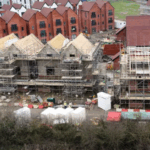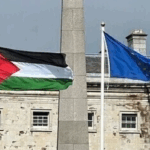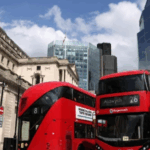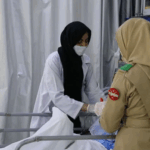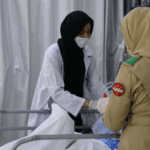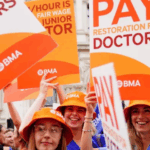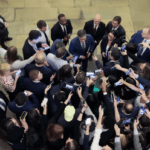Germany is marking the 35th anniversary of the fall of the Berlin Wall today with celebrations under the theme “Preserve Freedom!” This comes as the country faces a period of political instability, with Chancellor Olaf Scholz’s coalition government collapsing earlier this week.
Scholz, whose three-party alliance fell on the same day that Donald Trump was re-elected in the United States, reflected on the significance of the anniversary in a national address, urging that the liberal ideals of 1989 are not to be taken for granted. “A look at our history and at the world around us shows this,” Scholz said, referencing the ongoing war in Ukraine and global concerns about the erosion of democratic values.
The fall of the Berlin Wall on November 9, 1989, marked a pivotal moment in history, ending decades of division between East and West Germany. After months of peaceful protests, East Germany opened its borders, allowing East Germans to travel freely to the West and setting the stage for reunification and the collapse of Soviet-backed communist regimes across Eastern Europe.
Jutta Krueger, a 75-year-old retiree who lived through the Wall’s fall, expressed disappointment over the political turmoil coinciding with the anniversary. “It’s a shame that it’s coinciding like this now,” Krueger said, but emphasized that the fall of the Wall remains a moment worth celebrating. “Freedom had arrived throughout Germany,” she recalled.
President Frank-Walter Steinmeier will officially launch the commemorations at the Berlin Wall Memorial, honoring the memory of at least 140 people who lost their lives trying to escape the German Democratic Republic (GDR) during the Cold War. In the evening, a “freedom party” will take place at Berlin’s Brandenburg Gate, with a light and music show tracing the former path of the Wall.
On Sunday, the Russian protest band Pussy Riot will perform in front of the former headquarters of the Stasi, East Germany’s notorious secret police. Activists from around the world, including Belarusian opposition leader Svetlana Tikhanovskaya and Iranian dissident Masih Alinejad, have been invited to join the celebrations.
Cultural events such as talks, performances, and an open-air art exhibition will also take place. Claudia Roth, Germany’s culture minister, described the fall of the Wall as “one of the most joyous moments in world history,” while thousands of images created by citizens on the theme of “freedom” will be displayed along the Wall’s historic route.
However, the celebrations are shadowed by the rise of populism and political divisions, particularly in eastern Germany, where resentment over income disparities since reunification has fueled support for far-right parties like Alternative for Germany (AfD). The party’s recent rise was evident in state elections in September, where it gained significant support in the east.
Amid these divisions, government spokesperson Christiane Hoffmann reminded the nation that the anniversary coincides with a darker chapter in history. November 9 also marks the anniversary of Kristallnacht, the 1938 Nazi pogrom against Jews, which saw the destruction of synagogues, businesses, and homes, and the murder of at least 90 Jews. Hoffmann urged the country to remember the lessons of the past in light of current events.
As Germany reflects on the fall of the Berlin Wall, the anniversary serves as a reminder of both the triumph of freedom and the ongoing challenges facing the nation.









